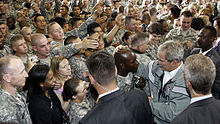And they really go through hell to do their jobs, especially with Shrillary. I wonder what Trump is going to say when this is brought to his attention. And even if he wanted to, I don't think the law would allow him to make up the difference.
It’s the federal cap, Secret Service officials said, that has posed a problem during this year’s election and become a subject of ire and frustration for many inside the agency.
When overtime payments drive an agent’s aggregate income for the year past the federal limit of $160,300 — no matter how early — the agent no longer earns paid overtime, even as they regularly clock in long past the 50-hour work week, traveling around the clock with the candidates, their families, the Obamas, the Bidens, and the press.
More @ Secret Service Agents Protecting Candidates Aren’t Getting Paid For All Their Work
It’s the federal cap, Secret Service officials said, that has posed a problem during this year’s election and become a subject of ire and frustration for many inside the agency.
When overtime payments drive an agent’s aggregate income for the year past the federal limit of $160,300 — no matter how early — the agent no longer earns paid overtime, even as they regularly clock in long past the 50-hour work week, traveling around the clock with the candidates, their families, the Obamas, the Bidens, and the press.
More @ Secret Service Agents Protecting Candidates Aren’t Getting Paid For All Their Work
